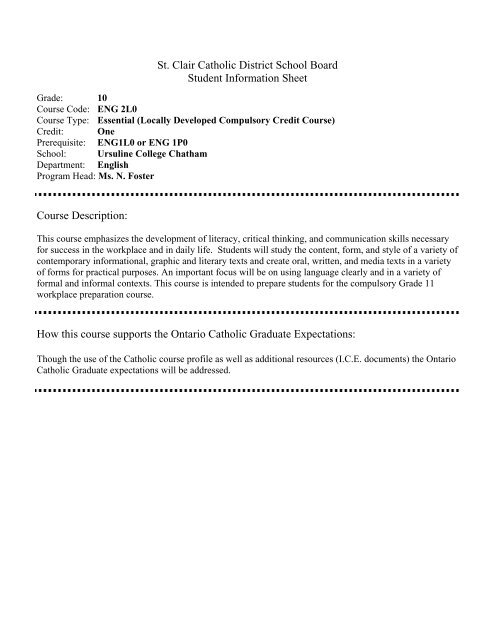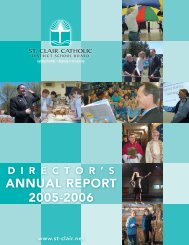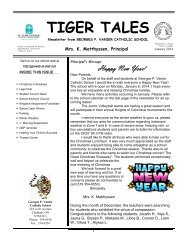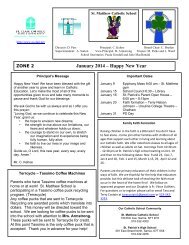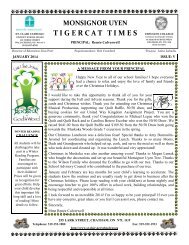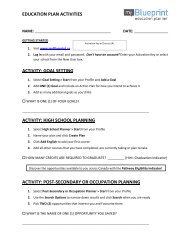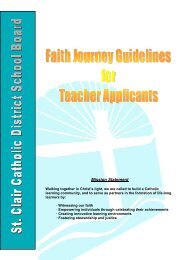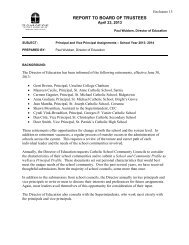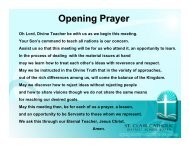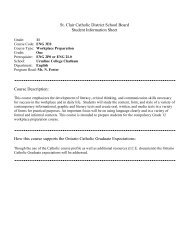ENG2LO - St Clair CDS Board
ENG2LO - St Clair CDS Board
ENG2LO - St Clair CDS Board
Create successful ePaper yourself
Turn your PDF publications into a flip-book with our unique Google optimized e-Paper software.
<strong>St</strong>. <strong>Clair</strong> Catholic District School <strong>Board</strong><br />
<strong>St</strong>udent Information Sheet<br />
Grade: 10<br />
Course Code: ENG 2L0<br />
Course Type: Essential (Locally Developed Compulsory Credit Course)<br />
Credit: One<br />
Prerequisite: ENG1L0 or ENG 1P0<br />
School: Ursuline College Chatham<br />
Department: English<br />
Program Head: Ms. N. Foster<br />
Course Description:<br />
This course emphasizes the development of literacy, critical thinking, and communication skills necessary<br />
for success in the workplace and in daily life. <strong>St</strong>udents will study the content, form, and style of a variety of<br />
contemporary informational, graphic and literary texts and create oral, written, and media texts in a variety<br />
of forms for practical purposes. An important focus will be on using language clearly and in a variety of<br />
formal and informal contexts. This course is intended to prepare students for the compulsory Grade 11<br />
workplace preparation course.<br />
How this course supports the Ontario Catholic Graduate Expectations:<br />
Though the use of the Catholic course profile as well as additional resources (I.C.E. documents) the Ontario<br />
Catholic Graduate expectations will be addressed.
1. Overall Expectations for <strong>St</strong>udent Learning:<br />
Through this course, students will be expected to demonstrate knowledge, skills and values related to<br />
the following strands:<br />
<strong>St</strong>rand: Oral Communication<br />
• Apply active listening strategies to<br />
gather information and ideas as<br />
they contribute to small-group<br />
and class discussions;<br />
• Use talk to extend critical and creative<br />
thinking skills ins small – and largegroup<br />
interactions;<br />
• Contribute ideas and engage in<br />
thoughtful conversation in classroom<br />
activities;<br />
• Assess their growth as oral<br />
communicators and set goals for<br />
extending their talking and listening<br />
skills<br />
<strong>St</strong>rand: Literature and Reading<br />
• Apply reading and viewing strategies to<br />
understand and make connections with<br />
texts that are part of school, workplace,<br />
and everyday life, with an emphasis on<br />
increasing independence;<br />
• Read and interpret a variety of<br />
engaging, authentic, and relevant print<br />
and non-print text forms, both teacher<br />
and student selected;<br />
• Assess their growth as independent<br />
readers and viewers and set goals for<br />
extending their reading and viewing<br />
skills.<br />
<strong>St</strong>rand: Writing Skills<br />
• Apply the writing process by generating<br />
and organizing ideas, writing a draft,<br />
revising, and editing to produce a<br />
variety of short written texts;<br />
• Convey information and ideas with<br />
clarity and coherence in a variety of<br />
short print and non-print forms;<br />
• Assess their growth as writers and set<br />
goals for extending their writing skills.<br />
<strong>St</strong>rand: Media <strong>St</strong>udies<br />
• Demonstrate an understanding of a<br />
variety of media texts<br />
• Identify some media forms and explain<br />
how the conventions and techniques<br />
associated with them are used to create<br />
meaning<br />
• Create a variety of media texts for<br />
different purposes and audiences, using<br />
appropriate forms, conventions, and<br />
techniques<br />
• Reflect on and identify their strengths<br />
as media interpreters and creators,<br />
areas of improvement, and the<br />
strategies they found most helpful in<br />
understanding and creating media texts
2. Expectations: Learning Skills<br />
It is expected that students will also demonstrate the following (this is not intended to be an exhaustive list):<br />
• Responsibility<br />
• Organization<br />
• Independent work<br />
• Collaboration<br />
• Initiative<br />
• Self Regulation<br />
Learning skills will be assessed accurately and rigorously according to criteria which have been clearly<br />
communicated to the student and will be reported separately from student achievement of the curriculum<br />
expectations.<br />
The student’s demonstrated learning skills in each course will be evaluated using the fourpoint<br />
scale (E-excellent, G-Good, S-Satisfactory, N-Needs Improvement) and will be separated from the<br />
reporting of academic achievement.<br />
3. Supports For Higher Learning:<br />
Whenever accommodations are made to address student learning needs, or alternative or modified<br />
expectations are identified for a student, these accommodations, modifications, or alternative<br />
Expectations will be outlined in an IEP and will be communicated to parents.<br />
4. Course Breakdown and Assessment and Evaluation <strong>St</strong>rategies:<br />
One Novel <strong>St</strong>udy Various reading, writing and oral activities,<br />
individual, pairs and groups<br />
Homecoming<br />
Various titles from<br />
Passages to Mystery<br />
Two OSSLT Various reading and writing tasks www.eqao<br />
Three Non-Fiction Reading, writing and listening tasks<br />
related to various teen and cultural issues<br />
Don’t Panic<br />
Chicken Soup for the<br />
Teenage Soul<br />
Guest speakers<br />
Four Documentary<br />
Film<br />
Viewing, writing and oral tasks<br />
Interface Documentary.<br />
Org<br />
Various titles<br />
Five Field Trip Viewing, writing and oral tasks Viewing a documentary in t<br />
Six Writing Infused throughout the course:<br />
exposition, argumentation, reporting,<br />
description, process writing<br />
UCC Theatre<br />
Inside Track 1 and<br />
Various teacher<br />
Resources
5. Key Dates, Special Events and Additional Considerations:<br />
6. Teaching/Learning <strong>St</strong>rategies:<br />
*Group Work<br />
*Pairs Activities<br />
*Whole Class Activities<br />
*Lectures<br />
*Discussions<br />
*Presentations<br />
*Other – videos, computer lab – media pamphlets, use of documents, information<br />
texts, word study, research, etc.<br />
7. Assessment and Evaluation of <strong>St</strong>udent Learning:<br />
<strong>St</strong>udent achievement of the learning expectations will be evaluated according to the following breakdowns:<br />
Category<br />
Knowledge/Understanding (Term) 25%<br />
Thinking/Inquiry (Term) 25%<br />
Communication (Term) 25%<br />
Application (Term) 25%<br />
Final/Culminating Activities<br />
10%<br />
Term<br />
90%<br />
Evaluation<br />
Term: 90%<br />
Final: 10%<br />
Overall: 100%<br />
8. Additional Resources:<br />
Ontario Driver’s Handbook<br />
Be a Better Reader
9. School, Department and Classroom Policies: Refer to student handbook<br />
<strong>St</strong>udents’ Responsibilities With Respect to Evidence for Evaluation<br />
Late and Missed Assignments<br />
<strong>St</strong>udents are responsible for providing evidence of their achievement of the overall expectations within the<br />
time frame specified by the teacher.<br />
If a student is struggling with an assignment or is experiencing circumstances which make it impossible to<br />
complete an assignment within the specified time frame, he/she should speak to the teacher and an<br />
extension shall be granted and every support will be made for the student’s success.<br />
<strong>St</strong>udents must also understand that if assignments are not completed in the specified time frame because of<br />
lack of responsibility, then marks may be deducted for late assignments up to and including the full<br />
value of the assignment.<br />
PLAGARISM is using anyone else’s words or ideas and presenting them as your own. This includes the<br />
following:<br />
• Downloading<br />
• Copying<br />
• Purchasing<br />
• Cutting and pasting<br />
• Creating fake citations<br />
• Using ideas written by other students or parents<br />
(Please detach and return.)<br />
To the student and parent(s)/guardian:<br />
We have read and understood this student information sheet.<br />
Course Code:<br />
<strong>St</strong>udent’s signature: _________________________<br />
Date: ________________<br />
Parent/Guardian’s<br />
Signature: _________________________ Date: ________________


